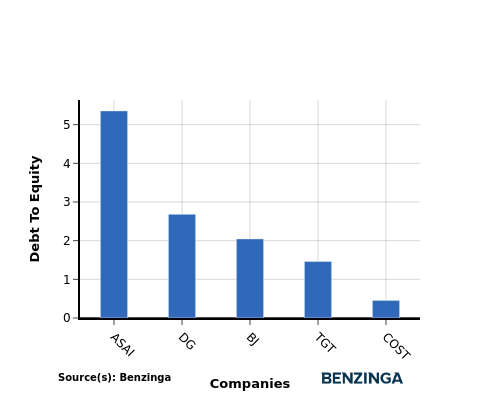In the dynamic and fiercely competitive business environment, conducting a thorough analysis of companies is crucial for investors and industry enthusiasts. In this article, we will perform an extensive industry comparison, evaluating Costco Wholesale COST in relation to its major competitors in the Consumer Staples Distribution & Retail industry. By closely examining crucial financial metrics, market position, and growth prospects, we aim to offer valuable insights for investors and shed light on company's performance within the industry.
Costco Wholesale Background
Costco operates a membership-based, no-frills retail model, predicated on offering a select product assortment in bulk quantities at bargain prices. The firm avoids maintaining costly product displays by keeping inventory on pallets and limits distribution expenses by storing its inventory at point of sale in the warehouse. Given Costco's frugal cost structure, the firm is able to price its merchandise below competing retailers, driving high sales volume per warehouse and allowing the retailer to generate strong profits on thin margins. Costco operates over 600 warehouses in the United States and boasts over 60% market share in the domestic warehouse club industry. Internationally, Costco operates another 270 warehouses, primarily in markets such as Canada, Mexico, Japan, and the UK.
| Company | P/E | P/B | P/S | ROE | EBITDA (in billions) | Gross Profit (in billions) | Revenue Growth |
|---|---|---|---|---|---|---|---|
| Costco Wholesale Corp | 50.48 | 16.48 | 1.38 | 7.43% | $2.79 | $7.3 | 5.75% |
| Walmart Inc | 31.74 | 5.83 | 0.76 | 6.73% | $11.33 | $41.56 | 5.69% |
| Target Corp | 17.94 | 5.52 | 0.69 | 10.65% | $2.62 | $8.52 | 1.67% |
| Dollar General Corp | 18.53 | 4.55 | 0.80 | 6.09% | $0.8 | $2.91 | -3.38% |
| BJ's Wholesale Club Holdings Inc | 19.86 | 7.02 | 0.52 | 10.37% | $0.27 | $0.96 | 8.68% |
| Sendas Distribuidora SA | 26.41 | 3.92 | 0.27 | 1.29% | $1.15 | $2.8 | 14.08% |
| Pricesmart Inc | 21.36 | 2.38 | 0.55 | 3.6% | $0.08 | $0.22 | 13.11% |
| Almacenes Exito SA | 24.18 | 0.50 | 0.14 | 1.88% | $426.56 | $1373.83 | -12.61% |
| Average | 22.86 | 4.25 | 0.53 | 5.8% | $63.26 | $204.4 | 3.89% |
By analyzing Costco Wholesale, we can infer the following trends:
-
The current Price to Earnings ratio of 50.48 is 2.21x higher than the industry average, indicating the stock is priced at a premium level according to the market sentiment.
-
With a Price to Book ratio of 16.48, which is 3.88x the industry average, Costco Wholesale might be considered overvalued in terms of its book value, as it is trading at a higher multiple compared to its industry peers.
-
The stock's relatively high Price to Sales ratio of 1.38, surpassing the industry average by 2.6x, may indicate an aspect of overvaluation in terms of sales performance.
-
The company has a higher Return on Equity (ROE) of 7.43%, which is 1.63% above the industry average. This suggests efficient use of equity to generate profits and demonstrates profitability and growth potential.
-
With lower Earnings Before Interest, Taxes, Depreciation, and Amortization (EBITDA) of $2.79 Billion, which is 0.04x below the industry average, the company may face lower profitability or financial challenges.
-
Compared to its industry, the company has lower gross profit of $7.3 Billion, which indicates 0.04x below the industry average, potentially indicating lower revenue after accounting for production costs.
-
The company's revenue growth of 5.75% is notably higher compared to the industry average of 3.89%, showcasing exceptional sales performance and strong demand for its products or services.
Debt To Equity Ratio

The debt-to-equity (D/E) ratio is a key indicator of a company's financial health and its reliance on debt financing.
Considering the debt-to-equity ratio in industry comparisons allows for a concise evaluation of a company's financial health and risk profile, aiding in informed decision-making.
In terms of the Debt-to-Equity ratio, Costco Wholesale can be assessed by comparing it to its top 4 peers, resulting in the following observations:
-
Costco Wholesale exhibits a stronger financial position compared to its top 4 peers in the sector, as indicated by its lower debt-to-equity ratio of 0.45.
-
This suggests that the company has a more favorable balance between debt and equity, which can be seen as a positive aspect for investors.
Key Takeaways
For Costco Wholesale, the PE, PB, and PS ratios are all high compared to industry peers, indicating a potentially overvalued stock. On the other hand, the high ROE and revenue growth suggest strong profitability and future prospects relative to competitors. However, the low EBITDA and gross profit figures may raise concerns about operational efficiency and cost management within the company.
This article was generated by Benzinga's automated content engine and reviewed by an editor.
Edge Rankings
Price Trend
© 2025 Benzinga.com. Benzinga does not provide investment advice. All rights reserved.
Trade confidently with insights and alerts from analyst ratings, free reports and breaking news that affects the stocks you care about.